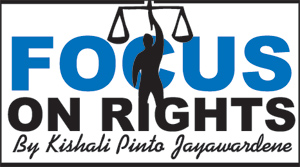Columns
Lies and bluster will not work any more
View(s):For long, it had been blissfully believed by this Government that the deliberate undermining of Sri Lanka’s systems of justice could be covered up by outright lies and bluster on the one hand coupled with the resurrection of the eternal bogeyman of the Liberation Tigers of Tamil Eelam (LTTE) on the other.
 Lying worked to some extent before
Lying worked to some extent before
This was a simple strategy which seemed to work well at first. Post-war, the aggravated militarisation of law enforcement and the centralisation of power in the Office of the Presidency went almost unnoticed as it were. Protests at the passing of the 18th Amendment to the Constitution were muted, except from the same old voices in the wilderness. A misguided few advocated in fact that Sri Lanka needed a benevolent dictator regardless of the fact that the terms ‘benevolent’ and ‘dictator’ were inherently and dangerously contradictory of each other.
A signal marker was the lamentable acquiescence of the Supreme Court to the 18th Amendment by a Bench (as we must not forget) presided over by a Chief Justice who was later witch-hunted out of office when the smallest judicial murmur was made regarding constitutional propriety to a Presidency grown bloated with post-war arrogance. The rapid politicisation of the Sri Lankan judiciary, evidenced most particularly from 1999, thus came to its inevitable head.
Factors leading to the March 2014 Resolution
As internal systems lost their integrity, Tamil and Muslim minorities became the focus of violent intimidation by self-styled protectors of Buddhism but whose very actions and behaviour confounded basic Buddhist precepts. And the Weliweriya violence showed the Sinhala majority that the glossy ideal of the protective Chinthanaya was a grave misconception. These lessons are now being learnt by Sinhala villagers from Horana to the deep South, month by month, as livelihood battles over water and land take central place.
These were all factors that led finally to the March 2014 Resolution by the United Nations Human Rights Council which has put Sri Lanka into the middle of an external inquiry on accountability issues.
Yet even with this formidable danger looming over its head, this Government appears to be under the impression that lies can still serve its cause. This is very well seen when one peruses the formal response submitted to the Council by the Government reacting to the 24th February report presented to the Council by the Office of the High Commissioner for Human Rights (OHCHR, A/HRC/25/23). This OHCHR report was heavily relied upon by the Council in the passing of the Resolution.
Government report is a shameful exercise
Shorn of numerous references to ‘categorical rejections’ (of the OHCHR stance) which liberally splatter this document, the Government’s report thereto (A/HRC/25/G/9), is a shameful exercise in pure chicanery. Even as a matter of strategy, the assertions made in this report are easily refuted. Quite laughably for instance, the Government response to the Weliweriya incident is to claim that the protestors turned violent.
And its reaction to attacks on media personnel is to claim that arrangements will be made for complaints to be lodged before the Press Council (see para 44). This is an unacceptable claim. The Press Council is a body that is not accepted by the media industry due to its supremely pro-government composition. Objections have been raised in regard to the appointment process itself. It is preposterous therefore that the Government makes these claims in an official response to the most critical United Nations report ever to come its way in decades.
Is it because of a misguided belief that these claims will not be examined for their veracity? Or is it due to wishful thinking that foreigners will not venture into the nitty-gritty of local systems? These are beliefs that should be discarded forthwith. Through our own monumental folly, we have placed ourselves in a situation where such outside intervention is now a reality. Lying may have been resorted to as a convenient practice in the past. This is no longer a viable option.
Constitutional theory is no longer relevant
Indeed, the Government’s response is marked by further absurdities which are too long to be dealt with in these column spaces. A large part of the response is devoted to refuting the position that Sri Lanka does not have a functional system of justice. We have copious paragraphs citing constitutional provisions.
But the Constitution is now not of any use in Sri Lanka. Surely we know that well? There is therefore little point in quoting it chapter and verse. Instead, what will be looked at is actual judicial performance in restraining arbitrary government action. Solid facts and figures will be important, not constitutional theory.
So what has been the record of the post-2009 Sri LankaP Supreme Court in that respect? How many fundamental rights actions have been decided against the executive and the legislature? How many habeas corpus actions have been determined to afford victims relief? What happened to the applications lodged by victims including those Tamil prisoners who died in the Vavuniya prison incident of 2013? Pleas of family members for redress were, as is a matter of record, literally tossed out of court.
The measure will be substantive performance
The same logic applies to criminal prosecutions, whether in regard to horrific incidents such as the 2006 Trincomalee killings of students or the murders of the 17 aid workers that same year. Rhetoric on the importance of legal standards such as the burden of proof, (which the Government has indulged in to its hearts’ content in the response), or even the promised enactment of a victim and witness protection law will not help much.
Substantive performance in regard to restoring constitutional values and the Rule of Law is the measure against which this Government will be held to account. Unfortunately for this country and its suffering people, (barring a miracle), it requires little effort to predict the outcome of this process.


